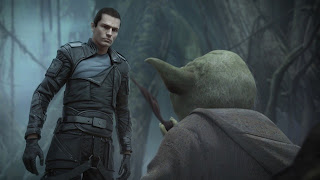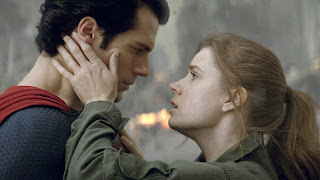I didn't play Star Wars: The Force Unleashed. I didn't like Star Wars: The Force Unleashed II. In spite of my lack of experience with the former, the latter felt a lot like an extended DLC title.
That being said, playing through the sequel didn't make me feel like exploring the original or seeing the story of Starkiller progress.
One thing is abundantly clear in this game, which is betrayed by the presence of series mainstays like Darth Vader, a visit to Dagobah with Yoda and even Princess Leia, there is no genuine connection to the Star Wars universe, nor is there much in the story to truly cultivate one.
Sure, I was using force lightning, chokes, mind tricks and saber throws like nobody's business, but it didn't bring any real satisfaction.
I remember playing Jedi Outcast and Jedi Academy and being far more engaged in the story, satisfied by the gameplay, and more willing to replay just to change my approach.
Kyle Katarn was an established figure, having appeared in a handful of games and a good piece of the literature around the millennium. He's a bit polarizing, but he offers a nice blank slate for gamers to project themselves onto in the context of games.
Most importantly, Katarn had more personality traits than "RAAAAAAAAAHHHHHHH!!!!" because Starkiller loves him some yelling.
In JO and JA, the gameplay is built to allow customization, more so in JA because the premise is the creation of a new student to the Jedi academy.
Beyond customization of looks, abilities and all that jazz, you can align yourself with either the dark side or the light side of the Force.
TFUII gives you a fully fleshed out character, who already possesses all the cool abilities it was once fun to have to learn and unlock in the past. The powers are almost outdated, whether it be in the application or general development.
I got tired of seeing my hand glow blue to signify that I was locked into the force grab. I don't need to see the Force at work. I get that you need to be able to see what you're grabbing, but is there no better way to do this than a pulsing blue mass around your hand and the object.
On top of that, you don't get to decide anything with Starkiller until the very end, when you're granted to option to kill Vader or spare him... Only to have him tortured for answers to help the Rebel cause.
Seems a bit like black and slightly darker black, you know?
And to simplify such a monumental decision to A or B at the very end of woefully unfulfilling game makes it utterly worthless. So now that I chose not to kill Darth Vader, what do I get to do with it? Why is there no "Six Months Later" type of deal, where I can take missions to aid the Rebel Alliance, or had I chosen the dark side, missions to pick up where Vader and the original Starkiller failed in overthrowing the Emperor?
Sure, Starkiller is vindicated by not giving into his desire to kill Vader, but he's essentially turning a blind eye to Vader getting the Guantanamo Bay treatment.
TFUII feels very limited in almost every aspect of character development, both via the story and leveling up.
 Part of the problem is that the entire game has Starkiller focused on one task without straying for even a single moment, which he's more than happy to regularly shout at Rahm Kota, the general of the Rebel Alliance at the time.
Part of the problem is that the entire game has Starkiller focused on one task without straying for even a single moment, which he's more than happy to regularly shout at Rahm Kota, the general of the Rebel Alliance at the time.HE HAS TO GET TO JUNO!!!
Perhaps it is in this singular goal that I could have used the context that likely would have been provided in the first game.
The Starkiller we're in control of is a clone of the original secret apprentice, Subject 1138, Darth Vader's pet project, Galen Marek, whom he trained from a young age in order to ultimately overthrow the Emperor.
Starkiller has a bunch of residual memories presumably belonging to Marek, which apparently gives him a predisposition towards being an *sshole.
I don't like Starkiller. He is an angsty little b*tch who I would have gladly allowed to be drawn and quartered in whatever way they would to that in the Star Wars universe.
The only reason I didn't is because A) it isn't possible and B) I wanted to finish the game before I hated it anymore than necessary.
TFUII can be summed up fairly simply as repetitive, bland and sadly aged.
The game is just three years old, but all the assets feel 10 years old.
It is a pretty game, down to the character models and level designs, though the latter gets to be repetitive as you progress through ships and facilities with the same exact interior decorator.
I like the level of detail given to the characters, with Starkiller once again earning the likeness of Sam Witwer. You can see all the emotion the characters put off, down to the angriest of angry shouts at one another, which is most of the emotion you see.
Even so, none of it carries any weight because the game is essentially a linear killing spree with an exorbitant amount of QTEs.
F*ck do I hate QTEs when they're abused in such a way. Bigger enemies are best defeated with button mashing QTEs or just Press X at the right time, three times, to do some cool sh*t you wish you could to in natural gameplay, but will never be able to.
The final battle with Darth Vader is one long QTE with intermittent, frustrating bouts with unfinished Starkiller clones.
 It culminates with an extended button mash force lightning attack to a downed Vader that conveys the power Starkiller possesses, but eliminates the threat Vader has been built up to be throughout the Star Wars series.
It culminates with an extended button mash force lightning attack to a downed Vader that conveys the power Starkiller possesses, but eliminates the threat Vader has been built up to be throughout the Star Wars series.And to have the game end with Vader locked up (for the light side) brings about so many questions that are not okay to leave unanswered. You can't have happy f*cking endings here.
What happens in the time Vader's locked up? Are we cool just glossing over that substantial historical event that has never before been mentioned in the Star Wars universe? Seems pretty suspicious that something so huge would go unreported in the annals of history, right?
There's fun to be had in this game, if you're into sometimes frustrating battles against enemies who have next to no right being any sort of threat to you, and nonexistent character development or customization, or passing references to a much grander universe.
It is difficult to introduce a character in one game, kill him, and then craft a sequel where his clone picks up where he left off. It is difficult because it shouldn't be done. Or not in two titles.
TFUII could have very easily been an expansion of the first game, and probably would have been better suited as such, with an appropriate price.
Here's a trivial gripe: Dual-wielding lightsabers. What the f*ck is this sh*t?
There was a time when the whole double-bladed lightsaber was badass, but having two lightsabers feels intensely OP. Having two lightsabers was something you had to earn or were granted in dire or necessary circumstances.
Having two out all the time just dulls the awesomeness of being a Jedi.
If you spent the entire game with a single lightsaber, then, during the final push towards Darth Vader, Rahm Kota goes down (but doesn't die) and lends you his lightsaber to slice through hordes of stormtroopers and defeating a few Sith along the way, I'd be cool with it.
But having a pair of the most coveted weapons ever conceived from start to finish ruins it completely.
I prefer games that are either entirely satisfying or has a ton of replay value. This game has neither.

















